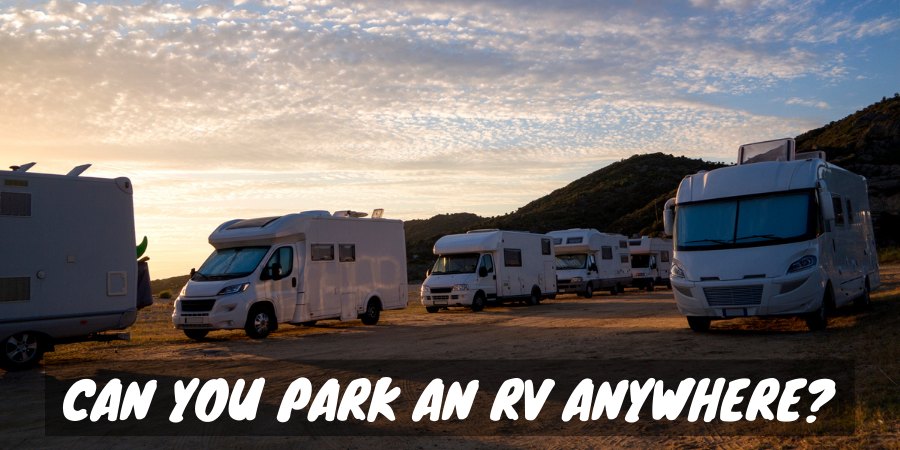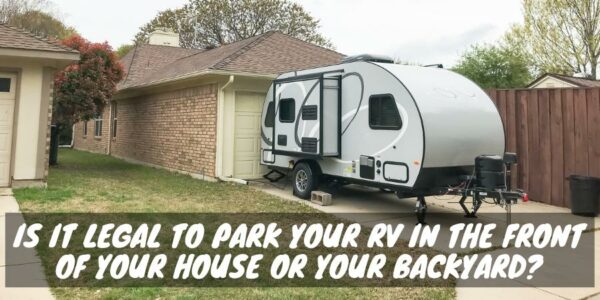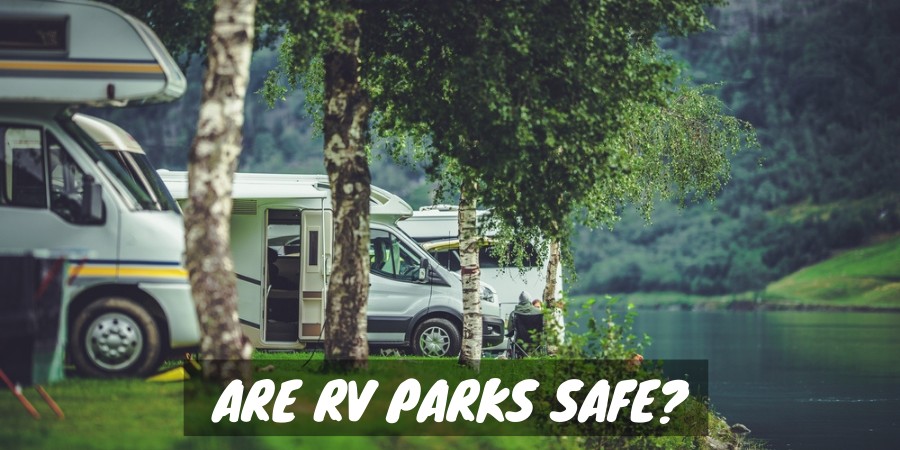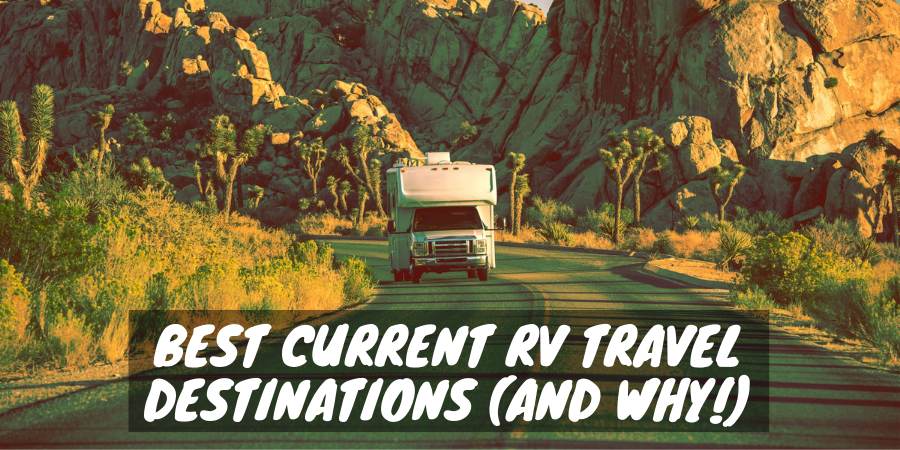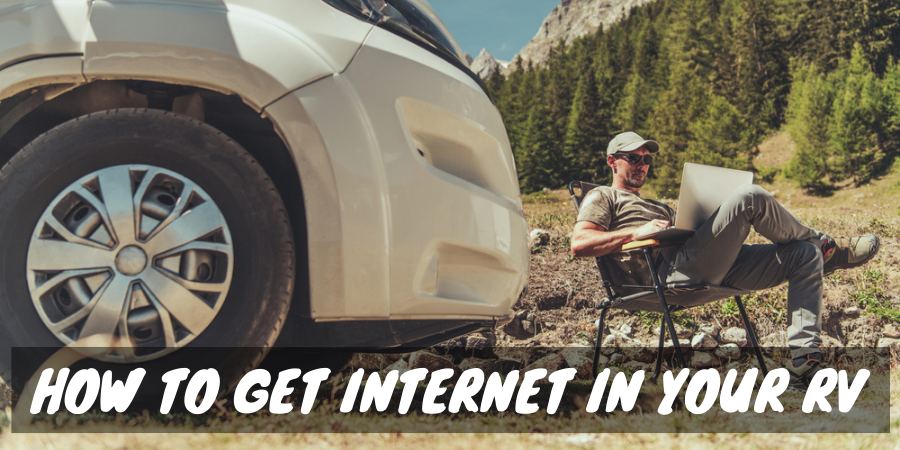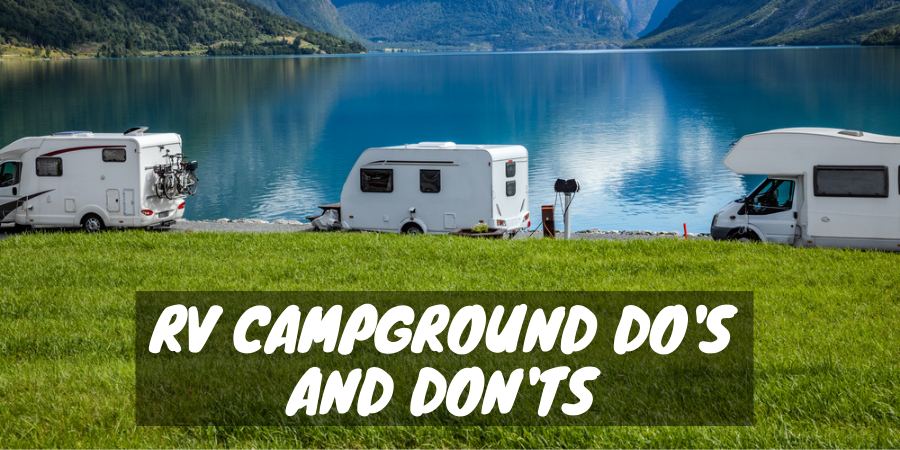Rving is as popular as ever, but can you park RVs anywhere? Many people want to save money during RV vacations or avoid paying for storage but don’t know the tips and tricks of safe and legal RV parking.
From your driveway to big box store parking lots, all the answers to where, when, and how to park your RV are right here, so keep reading!
Can You Park RVs Anywhere?
Sure, you can park an RV anywhere it will fit, but it doesn’t mean it’s safe or legal.
When you park an RV illegally, you may end up with cops pounding on your door at 3 am or having to pay a hefty towing fee or city fine, so why take the chance?
RV Parking Overnight No-No’s
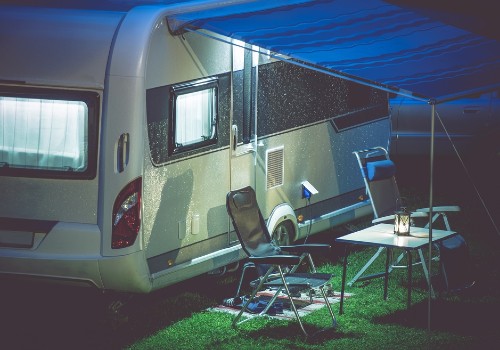
Before getting into the places where you can park your RV, let’s quickly hit three spots you never want to park overnight.
Rest Stops
Rest stops are a wonderful break from RV travels, but they are never meant for overnight or hours-long parking unless otherwise indicated by signage.
It’s rare not to have a rest stop patrolled by security, and they will ask you to move when you stay too long. Need a quick 30-minute nap? Be safe and get a snooze in, but set the alarm and leave.
Schools
Rving tipsters often mention schools as a possible place to park, but you really should ignore this advice.
Aside from the “creep factor” of having an RV sitting in a school zone, they are also rigorously patrolled by local police who prefer to keep the area clear for mandated school activities.
Industrial Parks
Many industrial parks have large, open parking lots that look very enticing to a road-weary RVer on a budget.
The real problem with industrial parks is that after-hours, they can be very desolate, leaving you in a dangerous situation if someone wants to come by and cause trouble.
Safe RV Parking Options
How to Find a Safe Place to Park Your RV for the Night (Video)
The best RV parking places are listed below, along with details about how to correctly follow the rules and each location’s pros and cons.
RV Campgrounds
Yes, an RV park is the most obvious place to park your recreational vehicle, but it will also cost you the most. Expect rates from $25-$150 a night.
The most significant convenience of RV campgrounds is that they are everywhere, even in large cities. Regions that seem devoid of RV parks when you search online will have random small mom-and-pop campgrounds not far from major roadways.
Pros:
- Electric, water, and sewer hookups
- Most sell propane
- Hot showers and bathroom facilities
- Most sell camping necessities
- Many have a pool or other activities
- Many have a laundry or Wi-Fi
- Level and clean parking campsites
- Offers more security
- Rarely a limit on length of stay
Cons:
- Cost per night adds up fast
- Sites are often close together, which reduces privacy
- Large and busy parks feel congested and “hectic”
- Many do not allow open fires
National and State Parks
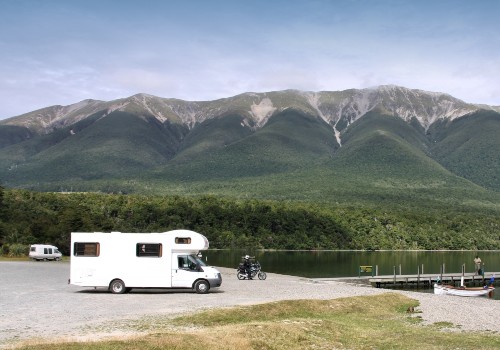
Next up is the highly popular national and state park campgrounds.
Most of these parks charge a nightly fee, but they are reasonable and offer some amenities and a slightly better security level.
The real key to parking your RV overnight is to make your reservation as early as possible in advance, as popular ones book up fast, especially over holiday breaks.
NOTE: An extra fee to purchase a National Park yearly or weekly pass is often required to access the park over the RV site’s cost.
Pros:
- Abundant locations across the country
- Low nightly rates
- Some measure of security from park rangers
- Larger, more spread out campsites with beautiful scenery
- Most have water and electric hookups
- Shower, bathroom, and even some with laundry facilities
Cons:
- Usually, a 10-14 day limit on stays
- Must book 24 hours in advance through the website in many instances
- Most have no direct sewer connections
- Sites are usually gravel and can be uneven
- No camp stores or nearby places to pick up supplies
BLM Land
BLM (Bureau of Land Management) land provides RV dispersed parking for both overnight and day use that is often free, but there are some RV campgrounds with nightly fees that range around $22-$25.
Most BLM or Army Corps of Engineers land is open to use for RV parking or recreational use, but the majority of the land is out west. For RV parking, search the database for accessible land in the US.
Pros:
- Dispersed RV parking provides solitude and privacy
- Free for dispersed parking, low fee for campground use
- Tons of locations across the U.S. Lower 48 and Alaska
Cons:
- Limit on campground and dispersed parking to 14 days per every 28 days
- Parking is on a first come, first served basis
- No hookups or amenities (other than the great outdoors)
- Roads to parking sites are not marked and can be very uneven
- No safety protections from other people or wildlife
Free Campgrounds (Yes, It’s True!)
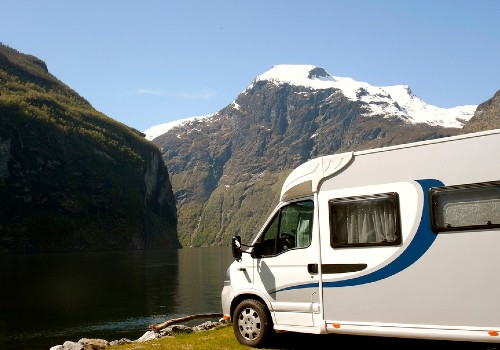
Many small cities or towns have free campgrounds for RV parking, even if some suggest you leave a small “donation” behind. The reasoning is to encourage tourists to come and spend a few dollars on the local businesses during their stay.
The Waylon Jennings Campground in Littleton, Texas, was a donation by the singer to the town where he grew up. These RV parking spots are typically not fancy, but they are free and usually within walking distance of local attractions.
Pros:
- Free and legal RV parking
- Often have electricity and water available
- Dump stations
- Near shops or restaurants
Cons:
- Bare-bones amenities and often look just like a parking lot
- Very little, if any, additional security
- Spots are first come, first served
- No long-term parking
Rural or Small Town Venues
Many RVers are unaware that there’s legal RV parking in many small towns at community centers, fairgrounds, and city or county parks. Costs can run below $10 nightly, which is excellent for RVers on a budget.
Many fairgrounds have RV hookups in place for vendors that travel in recreational vehicles. Between events, they often rent these sites out for free or low cost to travelers.
Many municipalities have also built RV parking facilities within county parks so that you can enjoy some RV hookups and nature in one stop.
TIP: Call ahead to nearby small-town city halls and inquire about RV parking. You may get a pleasant surprise at their offerings.
Pros:
- Free or low-cost
- Relaxing, laid-back atmosphere
- Some RV hookups
- Access to local attractions
Cons:
- Rarely full hookups are available
- May be an out-of-the-way drive to reach
Military Bases and VFWs
If you’re active-duty military or veteran, RV parking is available at many bases and VFWs across the US. Rates are low or no-cost but often need reservation requests to secure a spot.
Many Elks and Moose lodges across the country also have RV parking facilities, so check out this option if you’re a member.
Pros:
- Free or low rates
- Highest security you could ask for (within a military base)
- Partial to full hookups
- Access to base store or VFW
- Locations across the US
Cons:
- Only for military past and present
- Not many spots are available at any given time
Your Own Home
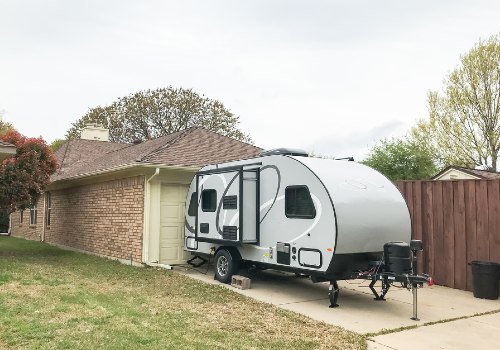
You own your home, so you may automatically think you can park your RV there, right?
Not necessarily. Every city has specific regulations on oversize vehicle parking, which includes RVs, trailers, boats, and motorhomes.
Some towns may require a permit (with a fee), while rural or unincorporated areas have no rules at all.
In most cities, RV parking on the street is limited to daylight parking or limits 7-14 consecutive days. RV parking in your driveway can also be restricted, mainly if an HOA controls your neighborhood.
Side or backyard RV parking is often acceptable, as long as the camper is not visible to neighbors by utilizing fencing or trees. Many coastal regions forbid RV parking on properties to avoid possible contamination from accidental sewage or chemical spills from the vehicle and discourage “renting” of the RV to tourists.
Pros:
- Free
- Can keep a watchful eye on your RV
- Convenient for packing and unpacking for trips
- Can use the RV as a “hideout” when you want a break from your family
Cons:
- Need to follow local oversize-vehicle parking laws
- Need to possibly deal with HOA restrictions
- Takes up a lot of space on your property
- Can block line-of-sight for other vehicles driving down the road
Vineyards and Wineries
A newer option for RVers is parking at small vineyards or breweries that welcome travelers to stay overnight to kick back and relax with a bottle of their wares or even volunteer to help the staff.
Harvest Host is a popular service that posts locations across the US and Canada that offer RV parking.
Pros:
- Affordable
- Beautiful, uncrowded parking
- Let’s you learn more about the wine or beer-making process
- Over 1,400 locations and growing
Cons:
- Must join the group and pay a yearly membership fee
- Locations may be off the beaten path
Private Property
Parking on a stranger’s driveway or property may sound weird, but there is a big trend toward locals renting out space for RVers on the move.
Want to Connect With a Community of Over 1,078 RV Enthusiasts?
Many RV parking services, such as Boondockers Welcome, offer free RV parking at homes across the world if you become a member. Craigslist is another source of locals willing to offer up an RV parking spot for a night or two.
Pros:
- More personal and safe parking (many offer electric hookups)
- Free or very low-cost
- Locations across the globe, even in popular areas
Cons:
- Must join and pay a yearly membership fee for some groups
- May not have any hookups – expect to boondock
City Streets
No state bans RV parking on streets, but nearly all cities have restrictions. Never park your RV for any length of time before checking the local laws, or you may end up with an expensive ticket or even have your RV towed.
Surprisingly, places like New York City, San Diego, and other metropolitan areas do allow you to legally park an RV on city streets for 24 hours or so if you can manage to find a parking spot!
Do the research, especially if you plan to sleep in the RV, as the street parking rules vary from location to location, and you don’t want problems.
Pros:
- Free
- Can put you right in the middle of the action
Cons:
- No hookups
- Can be noisy, and streetlights are bright
- Have to keep it low-key (no “setting up camp”)
- Crime or break-ins can be a concern
Truck Stops
Truck stops, especially Flying Js, welcome RVers with free parking overnight. Most sell propane and offer dump stations and potable water. With locations across the country, you are never far from a super-convenient RV parking spot.
Pros:
- Free
- Thousands of convenient locations
- Restaurant and/or store on-site
- Many offer hot showers for a fee
- Can fill gas, propane, and water tanks
Cons:
- Very noisy with constant in and out of trucks
- No hookups
Big Retailer Parking Lots
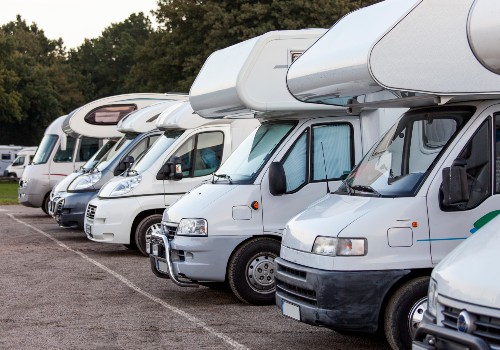
Most stores like Walmart, Cracker Barrel, Cabela’s, Camping World, Costco, and Sam’s Club allow RV parking for a night or two without a charge or hassle.
Most have security patrols and cameras for additional safety. Food or shopping is a short walk away. Do patronize the business if you park there, and also check in with a store manager if you arrive during business hours as a courtesy.
Never, ever set up camp chairs outside, pull out your awning, or dump your tanks!
Pros:
- Free
- Convenient just-off-the-highway locations across the country
- Food or shopping just feet away
- Good security
Cons:
- Can be noisy and bright
- Can only park for a couple of nights
- No hookups
- Some stores, especially in popular tourist towns, forbid RV parking
Casinos
Many casinos not only have dedicated RV parks but also allow free overnight parking in their standard lots. Some casinos even have outer-edge RV spots with electricity you can access for free on a first-come-first-served basis.
Even if you don’t plan to gamble, go inside and check in with valet services or security. The casino will give you a parking tag to put in your window, so no one comes knocking on your door at 4 AM.
Pros:
- Free
- Some provide electricity, while those with RV parks provide access to dump stations or even propane fills
- Food is available, and restrooms are open 24 hours
- Good security
Cons:
- Noisy and bright
- “Free” could cost you plenty if you go inside and gamble
Final Thoughts
The excitement of owning and traveling in an RV can quickly turn to anxiety as parking logistics and hefty costs present themselves.
Luckily, there are plenty of free, low-cost, convenient, or even luxurious RV parking options available now that you know where to look.
Just remember that with smart planning, you can get out there and enjoy the RV lifestyle on any budget!
10 Free Places to RV Park Overnight (Video)
"Man cannot discover new oceans unless he has the courage to lose sight of the shore."
-- Andre Gide

